Last Updated on August 30, 2025 by XAM CONTENT
Hello students, we are providing case study questions for class 8 Science. Case study questions are the new question format that is introduced in CBSE board. The resources for case study questions are very less. So, to help students we have created chapterwise case study questions for class 8 Science. In this article, you will find case study questions for cbse class 8 Science chapter 1 Exploring the Investigative World of Science.
| Chapter | Exploring the Investigative World of Science |
| Book | Curiosity: Textbook of Science for Grade 8 |
| Type of Questions | Case Study Questions |
| Nature of Questions | Competency Based Questions |
| Board | CBSE |
| Class | 8 |
| Subject | Science |
| Useful for | Class 8 Studying Students |
| Answers provided | Yes |
| Difficulty level | Mentioned |
| Important Link | Class 8 Science Chapterwise Case Study |
Case Study Questions on Exploring the Investigative World of Science
Case Study Question 1
Passage: The Puffed Puri Experiment
A group of students wanted to investigate why one side of a puri is thinner than the other when fried. They changed variables such as dough thickness, type of flour, and oil temperature while keeping other factors constant. They measured the time taken for the puri to puff and observed whether both sides were equally thick.
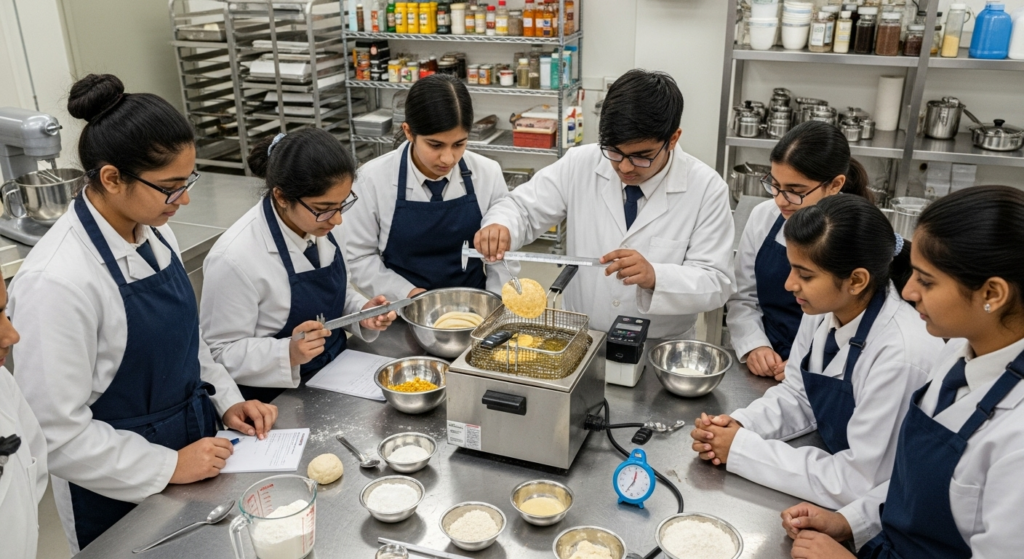
Questions:
(a) Identify the independent, dependent, and controlled variables in this experiment.
(b) Why is it important to change only one variable at a time?
(c) Suggest two other variables the students could investigate.
Case Study Question 2
Passage: The Link Between Forces and Weather
In a school project, students studied how differences in air pressure cause different weather patterns. They found that small differences in air pressure create breezes, while large differences can cause cyclones. They simulated these effects using a fan and a heated surface to create convection currents.
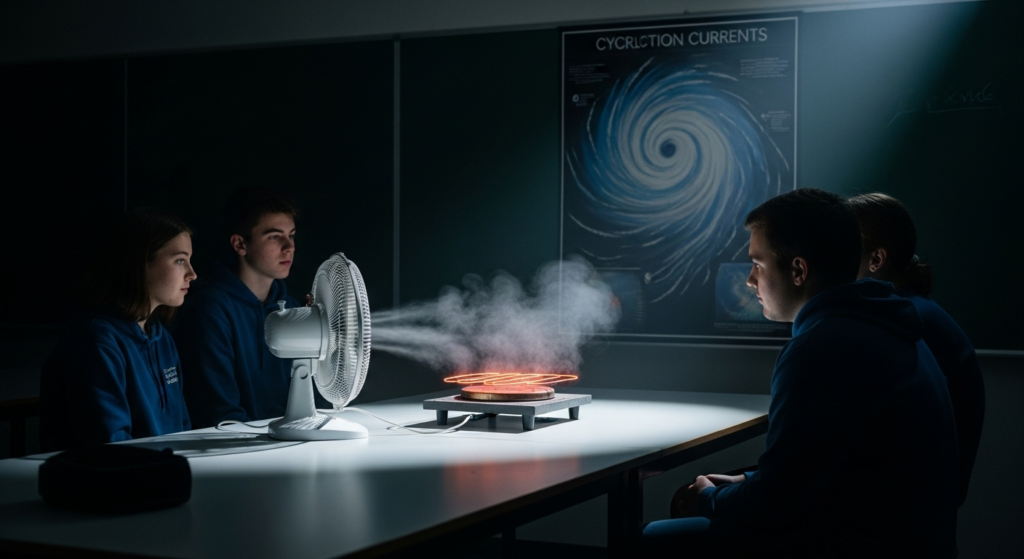
Questions:
(a) Explain how differences in air pressure lead to wind movement.
(b) How does understanding forces help in predicting extreme weather events?
(c) Suggest a safe classroom experiment to demonstrate the effect of pressure differences on air movement.
Case Study Question 3
Passage: The Role of Observation in Science
During a night sky observation activity, students noticed that the Moon changes shape over time. They recorded the Moon’s appearance for 30 days and matched their observations to the Moon’s phases. They related these changes to the positions of the Earth, Moon, and Sun.
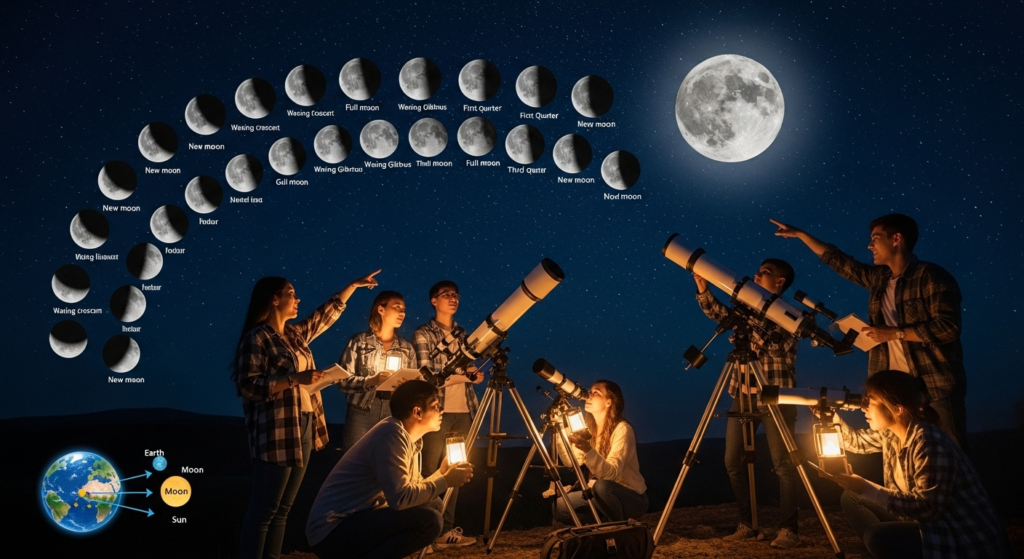
Questions:
(a) Why does the Moon appear to change shape during the month?
(b) How did ancient humans use Moon phases to create calendars?
(c) Suggest another natural cycle that could be used to track time.
Solutions:
Case Study Question 1: The Puffed Puri Experiment
(a) Variables:
- Independent variable – The factor that is changed: e.g., dough thickness, type of flour, or oil temperature.
- Dependent variable – The outcome measured: time taken for the puri to puff up, and whether both sides are equally thick.
- Controlled variables – Factors kept constant: size of the dough circle, method of dropping into oil, type of oil, frying utensil, and surrounding conditions.
(b) Importance of changing only one variable at a time:
Changing only one factor ensures that any observed differences in the result are caused solely by that variable. This eliminates confusion and makes the experiment’s conclusions more reliable.
(c) Other variables to investigate:
- Fresh dough vs. refrigerated dough.
- Effect of pricking small holes in the dough before frying.
Case Study Question 2: The Link Between Forces and Weather
(a) How differences in air pressure lead to wind movement:
Air moves from areas of high pressure to areas of low pressure. The greater the pressure difference, the stronger the movement of air. This movement of air is what we feel as wind. Small pressure differences cause breezes, while large differences can cause storms or cyclones.
(b) Role of forces in predicting extreme weather events:
By understanding the relationship between air pressure, force, and movement, scientists can predict the likelihood and severity of extreme events such as cyclones. Monitoring pressure changes helps in issuing timely warnings and reducing damage.
(c) Safe classroom experiment:
Place a lit incense stick near a heated metal plate and observe how the smoke moves towards a nearby cooler area. This demonstrates convection currents caused by temperature differences, which in turn create pressure differences and air movement.
Case Study Question 3: The Role of Observation in Science
(a) Why the Moon appears to change shape:
The Moon doesn’t actually change shape; we see different portions of its sunlit half from Earth as it orbits around us. This changing visible portion creates the phases of the Moon.
(b) Moon phases and ancient calendars:
Ancient humans used the regular cycle of Moon phases (approximately 29.5 days) to measure months. By observing full moons and new moons, they could track time and plan agricultural activities, festivals, and navigation.
(c) Another natural cycle for tracking time:
The apparent movement of the Sun in the sky — sunrise and sunset times — can be used to track days. Seasonal changes in sunrise/sunset patterns can also be used to divide the year into seasons.
We hope the given case study questions for Exploring the Investigative World of Science Class 8 helps you in your learning.
Case Study 4: The Puffing of a Puri
When dough is rolled into circles and fried in hot oil, a puri often swells up like a balloon. One side of the puri becomes thinner than the other. Factors like the thickness of dough, temperature of oil, and freshness of dough can affect this process. Systematic experiments, where only one variable is changed at a time, help in identifying the effect of each factor. Even today, scientists don’t fully understand all the reasons behind this everyday observation, but it demonstrates how science begins with curiosity and investigation.
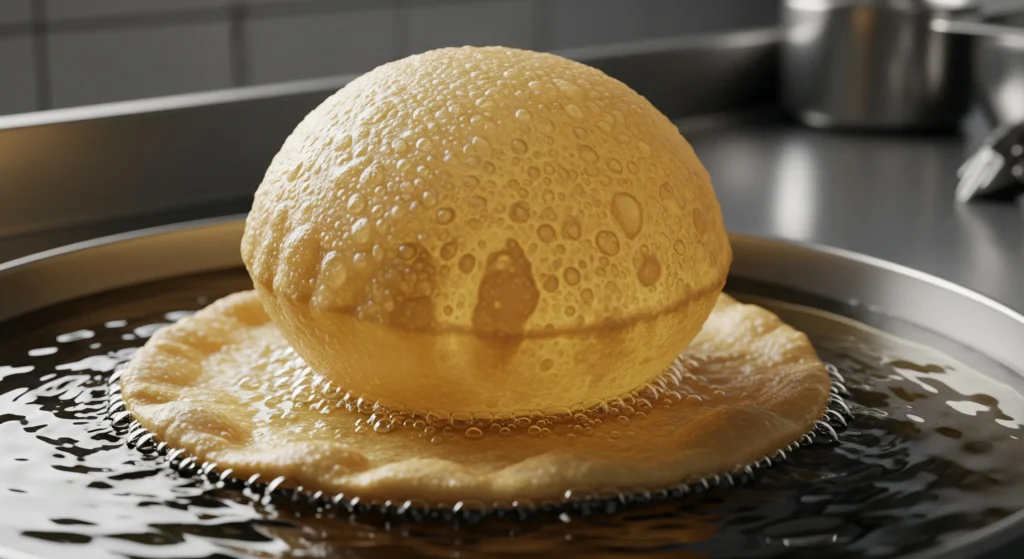
Questions
Q1. What is the key scientific principle demonstrated in the puri experiment?
(a) Systematic investigation
(b) Classification of materials
(c) Laws of reflection
(d) Role of microbes
Q2. Which of the following is a controlled variable in the puri experiment?
(a) Type of flour used
(b) Thickness of dough
(c) Way of dropping into oil
(d) Only one factor at a time, keeping others constant
Q3. Why is it important to keep other conditions constant while testing one factor?
(a) To save time in experiments
(b) To ensure accurate cause-effect observation
(c) To get tastier puris
(d) To increase oil temperature
Q4. What does this example mainly teach us about science?
(a) Science is only for laboratories
(b) Even everyday observations can be investigated scientifically
(c) Experiments must always succeed
(d) Only experts can investigate natural phenomena
Answers with Explanations
A1. (a) Systematic investigation
✔ Because the experiment follows a planned method of changing one factor at a time.
A2. (d) Only one factor at a time, keeping others constant
✔ This ensures fairness and reliability of results.
A3. (b) To ensure accurate cause-effect observation
✔ If multiple conditions change, it’s impossible to know which factor caused the result.
A4. (b) Even everyday observations can be investigated scientifically
✔ The puri example shows how science begins with curiosity about simple things.
Case Study 5: Forces and Pressure
A car slows down when brakes are applied. A ball thrown upwards comes back due to gravity. These are examples of forces acting on objects. Pressure is related to force but depends on the area over which the force acts. For example, strong winds and cyclones occur due to differences in air pressure across regions. Even a small pressure difference can create winds, but large differences can cause violent storms.

Questions
Q1. What force is responsible for a ball falling back after being thrown upward?
(a) Magnetic force
(b) Electric force
(c) Gravitational force
(d) Frictional force
Q2. Which factor determines pressure apart from force?
(a) Volume
(b) Area of contact
(c) Mass of object
(d) Density of air
Q3. What natural phenomenon occurs due to differences in air pressure?
(a) Reflection of light
(b) Formation of winds and cyclones
(c) Phases of the Moon
(d) Photosynthesis in plants
Q4. Why does a car stop when brakes are applied?
(a) Gravitational pull
(b) Force of friction
(c) Magnetic force of Earth
(d) Pressure of tyres
Answers with Explanations
A1. (c) Gravitational force
✔ Gravity pulls the ball back towards the Earth.
A2. (b) Area of contact
✔ Pressure = Force ÷ Area. Smaller area → higher pressure.
A3. (b) Formation of winds and cyclones
✔ Winds are movements of air caused by pressure differences.
A4. (b) Force of friction
✔ Brakes create friction with wheels, slowing and stopping the car.
Case Study 6: Phases of the Moon and Calendars
The Moon reflects sunlight, and its visible part changes every night due to its revolution around Earth. These changes are called phases of the Moon. Observing these periodic cycles helped humans invent early calendars. By carefully noting sunrises, sunsets, and lunar cycles, different cultures developed time-keeping systems, connecting celestial movements to daily life.
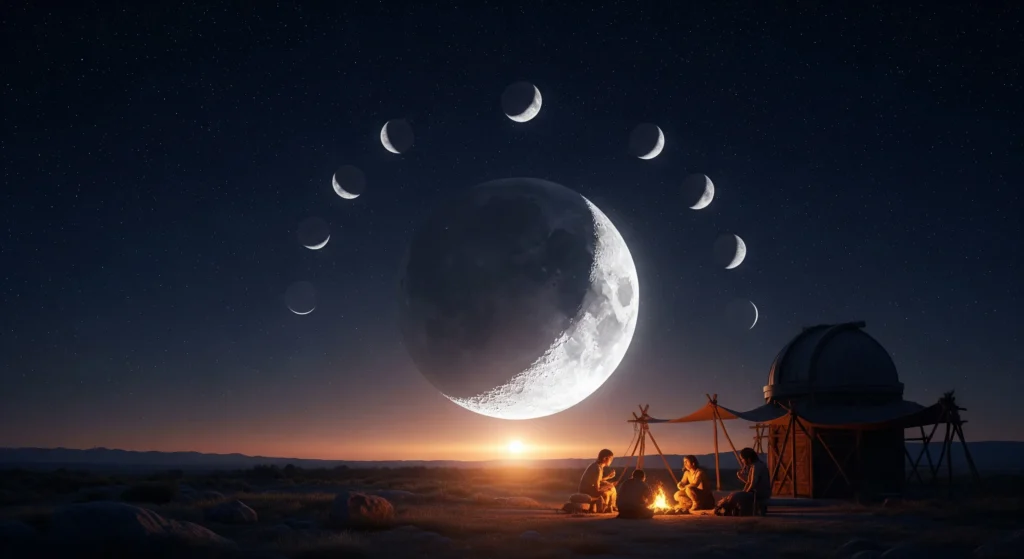
Questions
Q1. What causes the phases of the Moon?
(a) Rotation of Earth on its axis
(b) Revolution of Moon around Earth
(c) Tilt of Earth’s axis
(d) Changing distance between Earth and Sun
Q2. What property of the Moon allows us to see it at night?
(a) It emits light of its own
(b) It reflects sunlight
(c) It produces heat
(d) It glows due to gases
Q3. What important system was developed using observations of lunar cycles?
(a) Electricity
(b) Calendars
(c) Pressure gauge
(d) Microscope
Q4. Which statement best explains the connection between astronomy and human life?
(a) Moon phases are random and unrelated to life.
(b) Celestial observations helped humans track time.
(c) Moon phases only affect tides, not people.
(d) Sun and Moon movements have no effect on Earth.
Answers with Explanations
A1. (b) Revolution of Moon around Earth
✔ As the Moon orbits Earth, the portion lit by the Sun changes.
A2. (b) It reflects sunlight
✔ The Moon has no light of its own; we see reflected sunlight.
A3. (b) Calendars
✔ Early calendars were based on lunar and solar observations.
A4. (b) Celestial observations helped humans track time
✔ Calendars are an example of astronomy directly influencing daily life.
Related Posts
👉 Exploring the Investigative World of Science Assertion Reason Questions
👉 Exploring the Investigative World of Science MCQ Questions
👉 Exploring the Investigative World of Science NCERT Solutions
Also check
- Curiosity Class 8 Science Chapter 13 Our Home: Earth, a Unique Life Sustaining Planet Case Study Questions
- Curiosity Class 8 Science Chapter 12 How Nature Works in Harmony Case Study Questions
- Curiosity Class 8 Science Chapter 11 Keeping Time with the Skies Case Study Questions
- Curiosity Class 8 Science Chapter 10 Light: Mirrors and Lenses Case Study Questions
- Curiosity Class 8 Science Chapter 9 The Amazing World of Solutes, Solvents, and Solutions Case Study Questions
- Curiosity Class 8 Science Chapter 8 Nature of Matter: Elements, Compounds, and Mixtures Case Study Questions
- Curiosity Class 8 Science Chapter 7 Particulate Nature of Matter Case Study Questions
- Curiosity Class 8 Science Chapter 6 Pressure, Winds, Storms, and Cyclones Case Study Questions
- Curiosity Class 8 Science Chapter 5 Exploring Forces Case Study Questions
- Curiosity Class 8 Science Chapter 4 Electricity: Magnetic and Heating Effects Case Study Questions
- Curiosity Class 8 Science Chapter 3 Health: The Ultimate Treasure Case Study Questions
- Curiosity Class 8 Science Chapter 2 The Invisible Living World Case Study Questions
- Curiosity Class 8 Science Chapter 1 Exploring the Investigative World of Science Case Study Questions
🚀 Boost Your Exam Prep: Get case study questions for all subjects (Class 6-12) now!
👉 Explore more resources on CBSE Class 8

Topics from which case study questions may be asked
- Curiosity and Scientific Investigation
- Applications of Scientific Principles
- Understanding Matter and Natural Phenomena
- Earth, Ecosystems, and Climate
Science evolves with curiosity, experimentation, and observation.
Chapter 1 – Exploring the Investigative World of Science Covers the Following Topics:
- The spirit of curiosity in science – asking “Why?” and “How?” questions.
- Evolution of scientific understanding – from Grade 6 observations to Grade 8 investigations.
- Systematic investigation – asking focused questions, designing experiments, and recording observations.
- Puri experiment example – identifying variables, controlling conditions, and interpreting results.
- Applications of scientific investigation –
- Microorganisms: helpful and harmful roles.
- Health and disease prevention (nutrition, exercise, medicines, vaccines).
- Electric current and its heating & magnetic effects.
- Forces and their effects on motion.
- Pressure and its role in air movement, winds, and cyclones.
- Matter and particles – solids, liquids, gases, elements, compounds, mixtures, and solutions.
- Light – reflection, refraction, mirrors, lenses, and vision correction.
- Moon and its phases – relation to Sun-Earth-Moon positions and creation of calendars.
- Ecosystems and interdependence of life – relationships between living organisms and their environment.
- Earth as a habitable planet – conditions for life and impact of human activities on climate.
Important Keywords
- Curiosity: The desire to know or learn something new; the starting point of all scientific inquiry.
- Investigation: A systematic process of exploring and studying to find answers to specific questions.
- Observation: Carefully noticing and recording facts or events using the senses or tools.
- Experiment: A planned activity or test carried out to discover, prove, or demonstrate something.
- Variables: Factors that can change in an experiment.
- Systematic Investigation: A methodical approach to problem-solving that involves planning, controlling variables, and analyzing results.
- Microorganisms: Tiny living organisms like bacteria, fungi, and protozoa that are often too small to see without a microscope.
- Heating Effect of Electric Current: The phenomenon where an electric current produces heat when it flows through a conductor.
- Magnetic Effect of Electric Current: The phenomenon where an electric current produces a magnetic field around it.
- Force: A push or pull on an object that can change its motion, direction, or shape.
- Pressure: The force applied per unit area on a surface.
- Cyclone: A large-scale air mass that rotates around a strong center of low atmospheric pressure, often causing severe weather.
- Particles of Matter: Tiny building blocks that make up all substances; they are in constant motion.
- Elements: Pure substances made up of only one type of atom.
- Compounds: Substances made of two or more elements chemically combined in fixed proportions.
- Mixtures: Combinations of two or more substances that are not chemically bonded and can be separated physically.
- Solutions: Mixtures where one substance (solute) is completely dissolved in another (solvent).
- Reflection: The bouncing back of light when it hits a surface.
- Refraction: The bending of light as it passes from one medium to another.
- Ecosystem: A community of living organisms interacting with each other and their physical environment.
- Habitable Planet: A planet that has the right conditions to support life.
- Climate Change: Long-term changes in temperature, weather patterns, and climate, often caused by human activities.
Download Customised White Label Study Materials in MS Word Format
We are providing teaching resources to teachers and coaching institute looking for customised study materials in MS word format. Our High-quality editable study material which is prepared by the expert faculties are Highly useful for Teachers, Mentors, Tutors, Faculties, Coaching Institutes, Coaching Experts, Tuition Centers.
Frequently Asked Questions (FAQs) on Exploring the Investigative World of Science Case Study Questions
Q1: What are case study questions in Exploring the Investigative World of Science?
A1: These are competency-based questions based on real-life situations and concepts from Exploring the Investigative World of Science.
Q2: Are case study questions part of Class 8 Science CBSE exams?
A2: Yes, CBSE includes such questions in line with NEP guidelines.
Q3: What does ‘investigation’ in science mean?
A3: In science, investigation means systematically studying a question or problem. It involves asking focused questions, planning experiments, collecting observations, and using evidence to reach conclusions.
Q4: Why is it important to change only one variable at a time in an experiment?
A4: Changing only one variable at a time ensures that the results are due to that specific change. If multiple variables are changed, it becomes impossible to know which factor caused the observed effect.
Q5: How are curiosity and observation connected in science?
A5: Curiosity motivates us to ask questions, while observation helps us gather information to answer those questions. Together, they form the starting point of any scientific investigation.
Q6: What is the role of forces in our daily life as explained in this chapter?
A6: Forces make objects start or stop moving, change their direction, or alter their shape. They also play a role in natural events like wind, storms, and cyclones by moving air from high-pressure to low-pressure areas.
Q7: How did ancient people use scientific observations in daily life?
A7: Ancient people observed natural cycles, such as the Moon’s phases and the Sun’s movement, to create calendars, plan farming activities, and organise festivals. These observations formed the basis of early science.
Q8: Are there any online resources or tools available for practicing class 8 science curiosity “Exploring the Investigative World of Science” case study questions?
A8: We provide case study questions for CBSE Class 8 Science Curiosity on our website. Students can visit the website and practice sufficient case study questions and prepare for their exams. If you need more case study questions, then you can visit Physics Gurukul website. they are having a large collection of case study questions for all classes.



